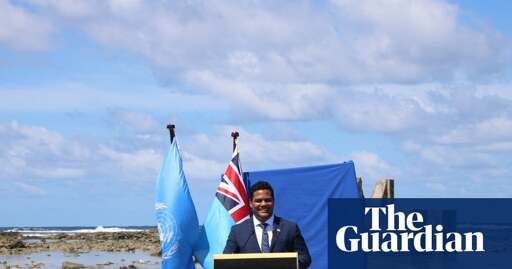By 2050, the government expects half of the capital, Funafuti, to be flooded by tidal waters. By the end of the century, more than 90% of the land could be submerged. “As our land disappears, we have no choice but to become the world’s first digital nation,” Kofe declared in a video address to delegates at the UN climate conference Cop27. In the background was an islet of Funafuti, Te Afualiku.
“Islands like this one won’t survive,” Kofe said. Then came the twist: “So, we will recreate them virtually.”
Organ music swelled, the camera zoomed out, and the image of Kofe standing on the island flickered like a glitch in a video game. The leaves of the trees behind Kofe were bathed in sunlight, but as the view widened, the sky was revealed as a black void: Kofe was delivering his address from a digital rendition of the islet. As he continued his speech, the camera went higher, as if on a drone, and Kofe became smaller and smaller. Frigate birds circled above him, signifying bad weather. “Without a global conscience and a global commitment to our shared wellbeing,” Kofe continued, “we may soon find the rest of the world joining us online, as their lands disappear.”
As an advertisement to draw attention to Tuvalu’s grim predicament, it was designed to shock. The words Kofe spoke had been polished by an Australian creative agency affiliated with Accenture. They generated a tremendous market response: travel vloggers began to descend on the “sinking nation”, followed by country-counting tourists who wanted to get a glimpse before it disappears.
The idea of a virtual future for Tuvalu generated frenzied commentary. By creating a digital clone of the islands, a headline in the Guardian pondered, could we not “preserve the island nation before it’s lost to the collapsing climate?” The Sydney Morning Herald reported, “Tuvalu turns to metaverse to guarantee its existence.” The video won an award at the Cannes Lions international festival of creativity, beating ads for Mastercard and Budweiser. Adweek reported on the “award-winning metaverse project that’s saving a nation”.
This was a time when the US media was producing two articles a day about the metaverse: it was going to “shape our future”, it was the “future of connection”, it was “reality beyond fantasy”. It also became something that might save poor Tuvalu from extinction. Yet this outlandish idea sidestepped the most basic question posed by Tuvalu’s possible submersion: where are the people going to go? Last year, I flew from New York to Fiji, which provides the only aerial connection to Tuvalu, to find out how Tuvaluans felt about the future that the government had imagined for them.


